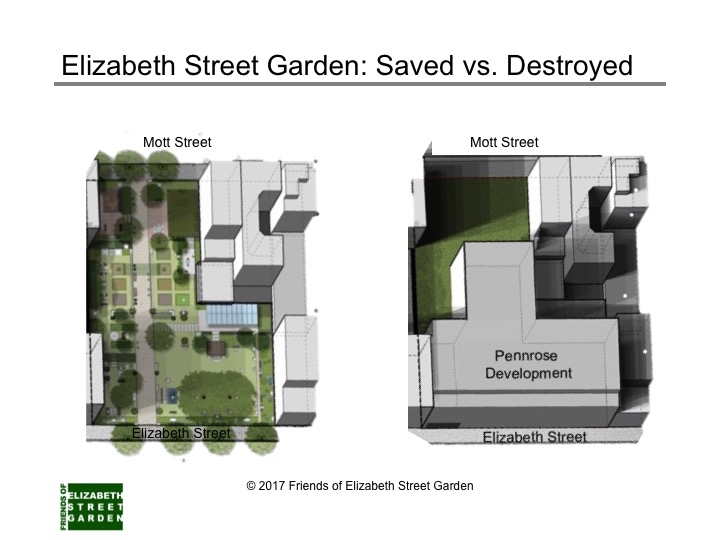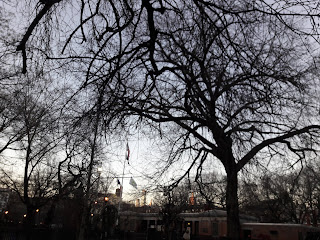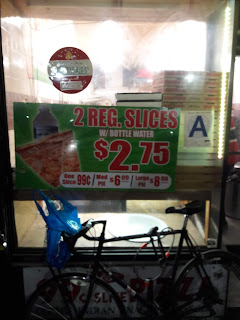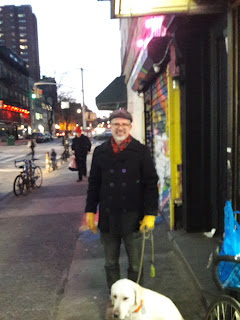 |
| Magali Regis "that's my sign at the hearing for Elizabeth Street Garden. The reverse side: If you're not outraged, you're not paying attention! Elizabeth Street Garden is one of our most extraordinary, unique & stunning garden in New York City. Every city in the US or in the world would be envious that we have this, yet our public officials, Margaret Chin in particular (City Council District 1) see no value in it. If all of it 20 trees, shrubs, flowering plants, monumental sculptures, trellises, gazebos, lawns, birds, monarch butterflies, bees, insects, etc. for whom this is habitat could easily be moved (a nearly impossible feat) and auctioned off to the highest bidder at Sotherbys like the invaluable piece of (environmental) art that it is - and transported elsewhere; cities around the world would be fighting to have it, And New York sees no value in this magnificent public green space treasured by tens of thousands each year who step inside and are in awe of its beauty. The City wants to destroy it to build a 123 Unit senior housing complex on the lot. Sure we need housing for seniors, but not at the expense of a beloved community garden which is the only green space residents of Little Italy, Soho and Nolita have. My heart aches but we most continue the fight. It's a long, long, painful road though. Elizabeth Street Garden, NYCCGC, Françoise Bouffault, Cindy Worley, Barbara Cahn, Campos Community Garden, LaGuardia Corner Gardens, 6BC Botanical Garden, Tranquility Farm, Felicia Young, Sarah Ferguson Ellen Belcher, Carolyn McCrory, Benjamin Heim Shepardhttps://www.elizabethstreetgarden.com/" |


Scene from Pull My Daisy.
George the Hawaiian Tree Snail, the last of his kind, the first species extinct this year.
All weekend, the environment was on everyone’s mind.
Saturday, it seemed like everyone I know was at the Extinction Rebellion meeting in the East Village, busy making plans, conspiring to put the environment back on the agenda national agenda.
The systems around us are not so supportive.
. Regimes of the normal, business as usual hamper and diminish solutions.
More than ever, we know its up to us to act, rather than wait.
Zack and Ken, Joan E and Catherine, Gil and Monica, LAK and Nan, countless friends were there.
Billy was wearing a pink suit.
We’ll write our Paterson soon ok?
We were in Paterson yesterday, he replied. We were there.
A man on stage explained a man had been killed.
The systems that kill black people at a whim, are the same forces that are heating the planet, depriving us of a future. The same government that kills black people is beholden to the corporations that are killing the planet.
I feel both apprehensive (we’ve been here before) and excited (together we can make a difference) as we always have? But is it enough?
Solidarity just might be our solution.
But its not always there.
The Church of Stop Shopping are carrying a large cardboard cutout of George the Hawaiian Tree Snail, a 14-year-old, the last of his species, who just died, the first species to go extinct this year.
Solidarity just might be our solution.
But its not always there.
Donna talked about the dynamic at Judson Church, condemning Ralph Nadar who called her to ask for a discount on copies of her book, Grassroots Gardening, for members of his staff. “What you did in Florida, that wasn’t a good move,” she pointed out, referring to him staying in the election in states that were competitive, essentially throwing the 2000 election to George Bush, instead of the man who had spent a lifetime fighting climate change, eventually winning a Nobel Prize for such efforts. Purity politics never works, certainly not in presidential elections. It has not worked in the past and it won’t work in the future she argued.
She referred to both ancient and modern testimonies.
The ancient testimony, from Joshua 5:15: “’Take off your sandals, for the place you are standing is holy.’ And he did so.”
The modern testimony was from the American Psychological Association highlighting research on the benefits of a natural environment from September 12, 2016:
“One area of substantial research is the benefit of natural environments or green spaces which can provide a calming atmosphere, evoke positive emotions and facilitate learning and alertness. Experiencing nature helps people recover from the mental fatigue of work. Some research has found that activity in natural outdoor settings can help reduce the symptoms of ADHD in children.”
“Urban environments can be designed for better mental health.”
“Gardening is something that happens with love. Its something sacred,” Schaper concluded, referring to both Joshua and the APA statement. Its something that helps us slow down and be alive. Without Elizabeth Street Garden, there will be fewer places to go in district one, forcing us to look further to find sacred grounds.
But in order to save the garden, we’re going to have to look to politics, respecting everyone along the way, regardless of their opinion.
On Tuesday night, I walked through the neighborhood with my old friend Steve, who I was arrested with fighting to defend the East Village Community Gardens, some two decades ago.
We talked about those struggles to save the gardens in a neoliberal city increasingly hell bent on maximizing profits by the inch.
The city is still a thrill to stroll through, dense with ideas and history.
But its dynamic edges are being washed away, one bit at a time.
Later, I made my way down Bleeker Street, past the old Yippie pad at #9, and then past Robert Frank’s house at #7. Looking up to snap a shot, he stood looking down waving.
After a few more shots, I made my way back to #18 to attended a community board meeting on the fate of the garden:
“Community Board 2 Public Hearing
Elizabeth Street Garden Working Group
Monday, Jan. 14, Public testimony 6:30 – 8:30 p.m. (approx.)
The Sheen Center’s Loreto Theater, 18 Bleecker St.
Why it’s critical to attend:
Elizabeth Street Garden Working Group
Monday, Jan. 14, Public testimony 6:30 – 8:30 p.m. (approx.)
The Sheen Center’s Loreto Theater, 18 Bleecker St.
Why it’s critical to attend:
· This is our last chance to weigh in on CB 2’s recommendations to the city.
· …the Garden has a tremendous base of support, particularly new CB 2 members who may not be as familiar with the importance of the Garden to the community.
· Our input will be included in the final report submitted to the full community board and the city.”
Inside speakers were lining up, garden activists and artists. Peter from Petit Versailles sat by me, Felicia, from Earth Celebrations a row down.
The proposal does not create open space, concluded one of the members of the Elizabeth Street Garden Working Group.
The proposal does not comply with the Americans with Disabilities Act.
There is so little open space in the city, especially downtown. The city has ignored the community’s pleas.
This plan represents a loss of community space, notes Norman Siegel, one of the lawyers defending the garden. Reject the plan, not each other, he pleads. Climate change is real. This garden helps alleviate some of the harmful effects.
The ESG brings the neighborhood together, providing increased green space.
Michael Gruen, the attorney for Friends of Elizabeth Street Garden, echoes Siegel’s sentiments, pointing out that the city has an obligation to keep this as an educational space, an open space:
“They do not have the right to take away open space. As important as affordable housing is, this isn’t going to work. One can’t take away the garden and create open space. This is irreplaceable.”
We need open space to breathe note those testifying, offering countless reasons to reject this misguided development.
“We need a garden, not a conference room,” argues Jeannine Kiely, President, of the Friends of Elizabeth Street Garden.
“I learned to be a citizen in this garden,” a young supporter testifies.
“This is the only nontransactional space in the city,” a supporter from Australia follows.
Felicia Young rails against against the proposal to raze the garden for housing and thousands of square feet of office space.:
“Dear Community Board Members: GARDENS ARE URBAN CLIMATE SOLUTIONS It makes no sense to destroy Elizabeth Street Garden that is providing essential green open space in a neighborhood of Nolita/Soho area of New York City that has no other green park spaces. Elizabeth Street Garden serves these essential needs for this community providing a place for adults, seniors and children to connect with nature and cultivate a magnificent garden, while also providing educational and cultural programming free of cost to the community. At this moment in time when the impacts of climate change are affecting our lives, we need to develop solutions to counter carbon in our atmosphere, reduce pollution run-off into our rivers and mitigate impact from extreme weather events, such as flooding from hurricanes --- the community gardens are an essential climate solution within the city. New York City Mayor Bill de Blasio signed an executive order that reaffirmed the city’s commitment to upholding the goals of the Paris Climate Agreement despite President Trump withdrawing the U.S. from the agreement. It directs city agencies to work with the Mayor’s Office of Sustainability to create a plan to further reduce their own greenhouse gas emissions. Mayor de Blasio and city representatives should recognize that the community gardens are a boon to this initiative and should play a central and pivotal role benefiting our commitment to the Paris Climate Agreement and goals of leading as a model ecologically sustainable city. The gardens contribute to the reduction of greenhouse gases with trees that absorb carbon dioxide and filter our air. They are mitigating impact of climate change as increasing storms and floods occur by absorbing water and preventing pollution runoff. They are also functioning as critical environmental education and community centers throughout the city connecting residents and children to ecological sustainability and climate issues through a visceral connection to the natural world, our water, air, earth, planet's atmosphere and an direct experience and understanding of how their local ecosystem and the gardens within their neighborhood connect to the city and global climate challenges. Best, Felicia Young Founder/Director Earth Celebrations-Ecological and Social Change through the Arts”
Emily Hellstrom, of Friends of Elizabeth Street Garden, follows:
“When Bill de Blasio first ran for Mayor, he promised to approach significant landuse issues from the bottomup, instead of the topdown approach Bloomberg used. He said he wanted grasssroots activism and civic engagement. Well we have been civicly engaged...
● 12 public hearings
● 4 Community Board Resolutions passed in support of saving 100% of the Garden
● 10,000 letters and signatures of support from local residents and small business owners
● Every elected local official from Congress down to our District Leaders, except for Mayor de Blasio and Council Member Chin
● Hundreds of free public events and and educational programs every year
● Hundrends of volunteers running those events
● 100,000 visitors each year, including local elementary students, families and seniors, as well as residents from around the city and tourists from around the world.
Tonight’s meeting is about the ULURP process, a supposed chance for the community to weigh in, but this has been a journey that this community has been on for nearly 6 years. A lot has happened over those 6 years as you just heard, but a lot hasn’t. We could have broken ground at 388 Hudson to build 5 times as much housing and 2 times the park that Haven Green has proposed. We could have united as a community to demand that we take back the illconcevied and rarely used Government owned parking lot at 2 Howard Street. We could have secured and ensured that the 152 units, the residents at 21 Spring, many of whom are seniors, continue to live in the affordable housing that is directly next to the Garden which is set to expire in just a few years! This Community IS Civicly Engaged. We have asked Mayor de Blasio and Margaret Chin to come see what we have done, we have asked them to listen to the Historic Little Italy and Soho Community, we have asked them for a viable compromise. They have answered: a 40 million dollar taxpayer/developer giveaway of land that has belonged to the public for over 200 years all for a dollar and housing that has no guarantee of being affordable past one generation. We ask Community Board 2 to stand by us once again and deliver our message loud and clear for the last time. This Garden should be saved in its entirety FOREVER.”
At the heart of the debate is a question about what kind of a city is this going to be, a place where we are left on our own, trembling in front of a cold impartial concrete authority or is it a place where people know each other? Is it going to be a suburban, impersonal space, or a place where those in the city look out for each other?
“There must be eyes upon the street, eyes belonging to those we might call the natural proprietors of the street,” argues Jane Jacobs. “The buildings on a street equipped to handle strangers and to insure the safety of both residents and strangers, must be oriented to the street. They cannot turn their backs or blank sides on it and leave it blind.”
Gardens provide just these eyes on the streets.
I was the last person to testify in the meeting:
“As a social worker who has provided housing from San Francisco to Chicago to New York, I want to reject this false divide between gardens and housing. We need both,” I begin. “Plus the garden is already home to countless non-human creatures.
Save the garden, save the city.
In an era of melting ice caps, flooding waters, and climate chaos, community gardens, such as ESG, cool the planet, providing storm water retention, adding social cohesion and beauty unavailable elsewhere in the neighborhood. Save the garden, save the city. Reject this proposal.”
Walking out of the meeting, sirens are blaring down Bleeker Street.
The city is hot.
Fireman descend on the street, lights filling the street,
Flooding it with red.
As soon as they come, they disappear.
We drink a few, telling stories, and make our way back down Bleeker Street.
Staring up at #7 Bleeker where Robert Frank probably made “Pull My Daisy” some sixty years prior.
He’s still there. That spirit is still here.
Hopefully, this is a space where we can all pull daisies, as Ginsberg and company did all those years ago:

 |
| robert d. kaplan top, botton, 7 Bleeker,September Robert Frank |





















































My middle daughter was formally diagnosed with ADHD, just started high school. Writing papers is tough for her. Her teacher encouraged her to try doing her writing in “INK for All”. The option to work offline combined with the dark mode really helps her limit distractions that used to cause huge headaches.
ReplyDelete